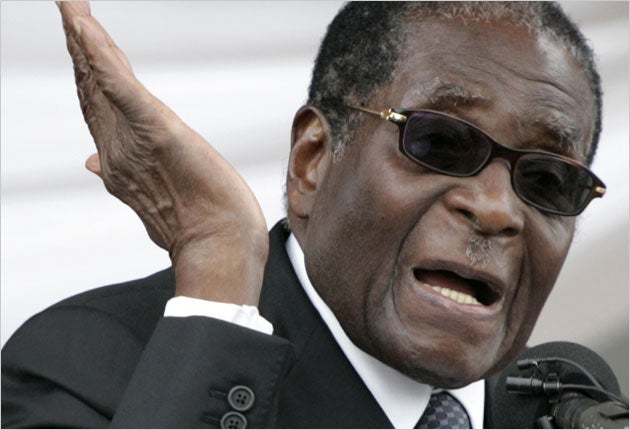No cholera in Zimbabwe, says Mugabe

Your support helps us to tell the story
From reproductive rights to climate change to Big Tech, The Independent is on the ground when the story is developing. Whether it's investigating the financials of Elon Musk's pro-Trump PAC or producing our latest documentary, 'The A Word', which shines a light on the American women fighting for reproductive rights, we know how important it is to parse out the facts from the messaging.
At such a critical moment in US history, we need reporters on the ground. Your donation allows us to keep sending journalists to speak to both sides of the story.
The Independent is trusted by Americans across the entire political spectrum. And unlike many other quality news outlets, we choose not to lock Americans out of our reporting and analysis with paywalls. We believe quality journalism should be available to everyone, paid for by those who can afford it.
Your support makes all the difference.President Robert Mugabe declared today that there was "no cholera" in Zimbabwe and the country's health crisis was over, even as the United Nations raised the death toll from the epidemic to 783.
Cholera has spread rapidly in the southern African nation because of the country's crumbling health care system and the lack of clean water. The UN said 16,403 cases have been reported.
Last week, Zimbabwe declared a health emergency because of cholera and the collapse of its health services. South African authorities have declared the cholera-hit border region with Zimbabwe a disaster area as the disease spreads to other countries.
At a state funeral today for a ruling party official, Mugabe insisted the outbreak of the waterborne disease had been "arrested" with the help of the World Health Organization and other aid agencies.
Mugabe lashed out at critics who have been calling for his ouster — and even military intervention — as concerns about Zimbabwe's deepening humanitarian crisis mounted.
"So now that there is no cholera, there is no cause for war anymore. We need doctors, not soldiers," he said during an hour-long address broadcast live on state television.
Mugabe has ruled his country since its 1980 independence from Britain and has refused to leave office following disputed elections in March. A power-sharing deal worked out in September with the opposition has been deadlocked over how to divide up Cabinet posts.
President George W. Bush, British Prime Minister Gordon Brown and French President Nicolas Sarkozy all have called recently for the 84-year-old leader to step down.
In Washington, the US ambassador to Harare, James McGee, told reporters at the State Department that the cholera problem is getting worse and that Mugabe's assertion that the health crisis was over showed "how out of touch he is with the reality" in Zimbabwe.
"The situation is truly grim," McGee said, "One man and his cronies — Robert Mugabe — are holding this country hostage."
Britain's Africa minister Mark Malloch-Brown also rejected Mugabe's claim that there was no longer a crisis in Zimbabwe.
"I don't know what world he is living in," Malloch-Brown said during a one-day trip to South Africa, where he visited a Johannesburg church housing 1,600 Zimbabweans who have fled the country.
Malloch-Brown called on South Africa to put more pressure on Mugabe to end the political and humanitarian crisis. South Africa has withheld 300 million rand ($30 million) in aid for Zimbabwe but otherwise has been reluctant to use its huge economic and political muscle against its neighbor.
"South Africa could do a lot more and it needs to do it now," said Malloch-Brown, who also met South African Health Minister Barbara Hogan, who is trying to contain the spread of cholera from across the border. He was also due to meet President Kgalema Motlanthe.
About 664 people have been treated for the waterborne disease and at least eight people have died in South Africa. Hundreds of Zimbabweans cross the border at Beitbridge every day to search for jobs in South Africa, buy supplies and, increasingly, seek medical treatment.
Phandu Skelemani, foreign minister of neighboring Botswana, which has been critical of Mugabe, said his country's border with Zimbabwe should remain open but he supported other measures to isolate Mugabe and his ZANU-PF party.
"If you switch off petrol (gasoline), I think that ZANU-PF will have to go. If that step is agreed and you then simultaneously airlift critical supplies like food and essential supplies to prevent Zimbabweans from starving to death, I think it will have desired effect," Skelemani told The Associated Press today.
Join our commenting forum
Join thought-provoking conversations, follow other Independent readers and see their replies
Comments